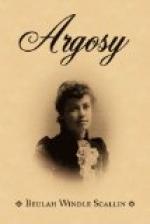The last house in the long street, at the Green end of it, was occupied by Miss Michin, a milliner and dressmaker, as a card in the window informed the passer-by. Not that the card was necessary, as of course in so small a place everybody knew everybody else; but it was a sort of sign of office, and was always most carefully replaced when Sarah Ann, Miss Michin’s Lilliputian maid, cleaned the window, which she did much oftener than was necessary—at least, Mrs. Dodd, the post-mistress, who lived opposite, said so. But then Mrs. Dodd had the shop and a young family to attend to, and did not find it possible to keep her own windows equally bright; so it was perhaps natural that she should find a comfort in remarking on her opposite neighbour in the manner we have described.
Miss Michin’s front parlour window was draped with white muslin curtains, which covered it entirely, preventing the eyes of the curious from taking surreptitious glances at the finery therein displayed, and destined to be seen for the first time at church on the persons of the fortunate owners. Just now, a fortnight before Christmas, the array of gay dress material which lay about on tables and chairs was more than usual; and Miss Michin and Nancy Forest—her decidedly pretty apprentice—were working as if their lives depended upon it. Nancy was the only apprentice Miss Michin had, and she had taken her when she was fourteen without a premium, on condition that when she should be “out of her time” (that would be in three years) she should give six months’ work in payment for the instruction she had received.
Nancy was now working out the six months, which fact shows her age to be between seventeen and eighteen. At that age a girl—above all, a pretty girl—likes to wear pretty things; and Nancy had many little refined tastes which other girls in her class of life have not—due, perhaps, to the fact that while a child she had been a sort of protegee of Miss Sabina Hurst’s up at the Manor Farm. Miss Sabina, who was herself not quite a lady, was nevertheless far above the Forests, who were in their employ, and had charge of an old farmhouse at Braley Brook. She was Mr. Hurst’s sister, and had been mistress at the Manor since Mrs. Hurst had died in giving birth to her little son Fred.
Mr. Hurst—a hard and relentless man in most things—was almost weak in his indulgence of his son. All his fancies must be gratified, and in this Miss Sabina concurred. One of Fred’s fancies had been to make a playmate of little Nancy Forest. It followed, then, that she had been a great deal at the Manor; but when the children grew older, and Fred took what his aunt and father termed “an absurd fancy” to be a musician, as his mother had been, it occurred to them that possibly later on he might take a yet more absurd idea, and want to marry his old playmate. Nancy was therefore banished from the Manor Farm.
But Fred, who was not accustomed to be crossed, often met his old friend on the hills and in the valleys; and after she had become apprenticed, he would often walk home with her part way—not as a lover, however. For the last two months he had broken this habit, and Nancy had not seen him.




